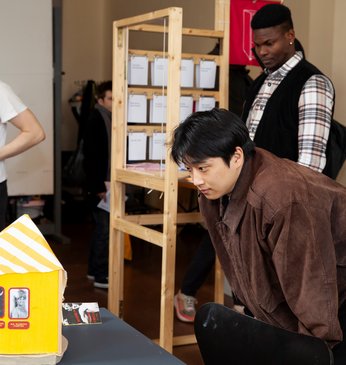By the end of this course, students will be better able to:
• demonstrate how to approach an archive, online and on-site critically.
• identify what is absent in archives as well as re-examining what is present.
• respond to specific materials of an archive in an artistic way and exhibit it so that it can be accessed by diverse audiences.
Opening the archive: hidden narratives of artefacts reinterpreted creatively
Opening the archive: hidden narratives of artefacts reinterpreted creatively
How can we approach archives in a creative way? How can the legacy of certain artefacts be challenged? What archival traces from past to present need to be re-examined? What stories do archives contain and whose are absent from them? What narratives need to be questioned and retold to help us better understand the complex problems we are facing today? Within the framework of the Bibliothek der Kunstler*innen, Weimar (BdKW) an artistic project that celebrates the work of FLINTA* artists linked to Weimar, we would like to artistically open up and scrutinise the complex themes within archiving, from its possibilities to its limitations, and respond actively and creatively in order to
create new artistic perspectives.
This will first be achieved through a series of online seminars that introduce the concepts of “archive,” and “collection” and the artistic practices that relate to them. We will also discuss the themes surrounding archive collections, the gaps and their limitations and examine existing creative projects that work with these themes.
Students will then explore existing online collections from the archives, libraries and museums in Weimar or of a particular area of interest. Later in the second week of the course, they will have the chance to visit one of the city’s archives and see its collection firsthand. Based on this primary research, students will be asked to work together to select a document, gap, section or part that they would like to “open out” and respond or question to in a creative way and show to an audience. The second week will also be more practically focussed with hands-on workshops that demonstrate the “opening out” of archival material. Starting with the strategies demonstrated by the BdKW, students will use a combination of these to create a final artwork that can be exhibited and shown within the public sphere.
NOTE:
This course includes an attendance phase in Weimar from March 14 to March 23, 2024.
Students (bachelor/master/PhD) from the faculties Art and Design, Media Art and Urbanism who are creative, curious, and interested in the topic of creative arts and archiving.
Sophie Foster, UK (1988)
MFA, Post Graduate Certification in Education (PGCE)
Learning Designer
http://sophiefoster.org
Maria Paula Maldonado, Colombia (1988)
MFA
Artist and cultural manager
https://mariapaulamaldonado.github.io/



Explore and experiment with archival strategies in artistic and creative ways, working with the artistic project Bibliothek der Kunstler*innen, Weimar and reflecting on existing archives. We will discuss the themes of archive collections, their gaps, and limitations and examine creative projects that address these themes. Explore existing archives from Weimar, Germany or your hometown and select a part to “open out” in a creative way. You will join a first-hand visit to one of Weimar’s archives alongside workshops demonstrating how to “open out” this archival material. Students will use these frameworks to create an artwork that can be shown to the public.